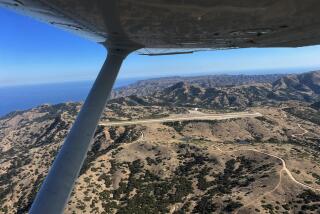Avianca Pilot Disputes Need to Use Specific Emergency Terms
- Share via
MELVILLE, N.Y. — The cockpit crew’s failure to use “standard phraseology” to report a critical fuel shortage was defended by an Avianca Airlines flight captain as hearings continued here Thursday on the January crash of an Avianca jetliner that ran out of fuel.
Air traffic controllers had testified earlier that, because Mauricio Klotz, co-pilot of the Boeing 707, used non-standard terms such “need priority” and “running out of fuel,” they failed to recognize the gravity of the situation and did not give the plane immediate clearance to land at New York’s John F. Kennedy Airport after numerous delays on its long flight from Colombia.
“I was very surprised that ‘priority’ and ‘running out of fuel’ meant nothing to them,” Avianca Capt. Saul Pertuz, a Colombian citizen, told a National Transportation Safety Board panel on Thursday. “I am terrified.”
Referring to an Avianca route manual used in the training of the airline’s pilots, Pertuz said there is nothing in it “that says we must use specific words . . . .”
“In my country and in this country, there have been a great number of (emergency situations) in which the pilot would not use the word ‘emergen” Pertuz said. “He would just tell them what happened.”
However, Klotz’s copy of the route manual, recovered from the wreckage of Flight 52, shows that Avianca’s pilots have been trained to “declare an emergency . . . and report fuel remaining . . . if the remaining usable fuel supply suggests the need for traffic priority to ensure a safer landing.”
The crew of Flight 52 did neither in the minutes before the big jet ran out of fuel and slammed into a wooded hillside in nearby Cove Neck, Long Island, killing 73 of the 158 aboard. Pilot Laureano Caviedes, co-pilot Klotz and the flight engineer, Matias Moyano, were among those who died.
Recordings recovered from the cockpit show that the failure to declare an emergency may have stemmed from a misunderstanding between the pilot and co-pilot.
Two languages were being spoken--English in the conversations with the controllers, Spanish in the conversations between the pilot and co-pilot. In addition, Caviedes had commented earlier that he was having trouble hearing what Klotz was saying.
After an initial attempt to land at Kennedy was aborted when the plane sank below the safe glide path in heavy, gusty winds, Klotz radioed controllers, “We’re running out of fuel . . . .”
Caviedes instantly told his co-pilot: “Tell him we’re in emergency.”
Sixteen seconds later, the captain repeated his order: “Advise him we are in an emergency.”
Four seconds after that, the captain asked Klotz, “Did you tell him?”
Although he had made no mention of an “emergency,” Klotz replied, “Yes, sir, I already advised him.”
About 30 seconds later, Klotz again radioed controllers that “we’re running out of fuel.”
“Did you already advise him that we don’t have fuel?” the pilot asked Klotz.
“Yes, sir,” the co-pilot replied.
Then, in one of the responses that remains a mystery, Klotz told controllers who asked him if his fuel was adequate for the new approach route they had recommended:
“I guess so. Thank you very much.” About 7 minutes later, its engines starved of fuel, the plane crashed.
More to Read
Inside the business of entertainment
The Wide Shot brings you news, analysis and insights on everything from streaming wars to production — and what it all means for the future.
You may occasionally receive promotional content from the Los Angeles Times.









